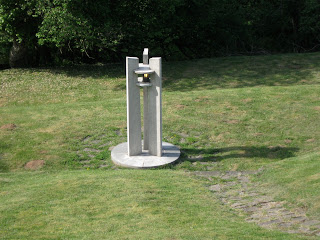In Europe, weekends didn't exempt us from school, and so unfortunately the day began with a lecture from one of our professors Dr. Streib outlining the expectations and requirements for receiving college credit for our trip. He explained that the reason we study policy is to look at the world (and how it functions) critically, and we must use this trip to do exactly that. We looked at some comparisons between the European Union and the United States in order to gauge our global standing. We then discussed the position paper we would be required to write where we would research and recommend a European policy for use in the United States. I have decided to write about cap and trade as a method for reducing carbon emissions.
Europe/US Statistical Comparisons:
Exports: European Union #1, United States #4
CO2 emissions/person: Germany #37, United States #11
Obesity: Germany #14, United States #1
Life Expectancy: United State #50
Luckily, myself along with eight other students were able to make an early escape from the morning lecture in order to go to a special session of EU Parliament dedicated to talking about volunteerism. When we arrived, it was barely recognizable from when were were there earlier! The building had been turned into a public festival with food stands, live music, and even a petting zoo outside! Once inside, we managed to navigate through all the booths and make our way into the chamber. Instead of sitting in the visitor's section up-top, we were ushered into the actual seats of parliament members to hear the volunteerism talk that was currently being translated in six different languages! (I sat in seat number 435, but haven't looked up what member sits there normally).
Something here that is very different from the U.S. is how public politics are. All the parties had booths set up inside the Parliament building and were handing out giveaways, including things for children like coloring books and toys. Politics is such a taboo subject here that I can't imagine seeing a child being given a Republican Party coloring book without the backlash hearing accusatory screams of indoctrination. In Europe, politics are just a part of day-to-day life, and no one seems to see the need to hide it in the shadows or sweep it under the rug.
The European Union had declared 2011 as the Year of Volunteerism. What surprised me most was that the Chair of Culture and Education used the United States as an example to follow in terms of encouraging young people to do volunteer work. She stated that like in the U.S., employers in Europe should look for service work on a resume as an essential trait of employees. However, she stressed that volunteering should never replace state provided services.
It was fascinating to see how the nationalities of different speakers affected what their outlook on volunteerism was. For example, the Vice President of the European Parliament is from the Czech Republic and explain that there were no volunteer organizations 20-30 years ago, and that any organizations that did exist for young people were compulsory and collapsed after the revolution. The previous compulsory nature of service organizations has tarnished the idea of volunteerism in the Czech Republic. Now the government is trying to instill the public with the idea that state can't operate as only individualistic or only state controlled, which is why volunteerism is so important to the state and for democracy.
On the other hand, the wealthier Western European countries have a problem with getting young people to volunteer due to the fact that most social and economic problems are addressed with government services, therefore there is very little gap for the public to fill (unlike the United States). These countries are encouraging their youth to cross borders and volunteer in struggling Eastern European countries.
The last part of the day consisted of driving up to Struthof, the former Natzweiler concentration camp in the Alsace region and the only concentration camp in France. I have been to several Holocaust museums including the ones in Israel and Washington, D.C. and although they made me sad, I didn't have an emotional reaction. Struthof was different because it was real. It broke down all my barriers and made me feel completely helpless and vulnerable, to say the least. I wont go into too much detail about my experience over the web because it was very emotional and very personal to me, but I was fortunate to have a caring and understanding group of people by my side to help me deal with my emotional reaction. I am also grateful to have my dad's advice, and in talking to him about my experience he said he was sorry that being there caused me so much pain but he knows that it will make me grow to be a stronger person. I'd have to agree that no matter how painful, I am grateful for this experience.
Peace, Love, and Never Again ~ Naomi
Pictures of the Day
Memorial built for those lost in the Holocaust
View from top of the hill
The camp I visited
There were memorials for all the death camps & the soldiers who dismantled them
Memorial for troops who shut down the camp
Entrance to the work camp where they mined granite
Eternal flame for children who died in the Holocaust
Sadly, I didn't manage to take any pictures at the Parliament festival because we were told that no cameras were allowed in





